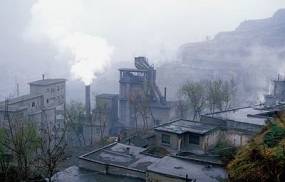If you didn’t read yesterday’s post, the story of Christian ethicist and professor Tom Killian and his presidential meeting to decide the fate of Moonbase Asimov, read it first and then come back to this post.
So, what did Tom Killian tell the president’s advisory committee? As a Christian, his worldview gave him a good reply. You may have your own ideas, but I’ll tell you what I think his reply would have been.
Clearly, the economics involved in maintaining the moonbase made for problems, the biggest of which was that the moonbase could not sustain itself without a series of expensive transports routinely bringing in food. The price spike in food that resulted led to rioting at the moonbase that had to be quelled through military intervention.
From a strictly rational viewpoint, sustainability is the 800-lb. gorilla in the room. In truth, sustainability is ALWAYS a primary consideration for any human endeavor. Want to climb Mount Everest? You can’t do it dressed for the beach, with only a handful of granola bars in your pocket. Want to have a moonbase that houses multiple thousands of people? Then you must find a way to address the very simple requirements of food and water. If you can’t, then you either watch the denizens of the moonbase die or you keep shoveling good money after bad to support an enterprise that has no future.
Many spiritually sensitive people would employ the tactic of Dahlia Winters, the leader of the Phos cult. While it is a laudable idea to minister to the needs of the people at the moonbase, adding more people only decreases sustainability further. Such thinking runs counter to common sense, only accelerating the moonbase’s problems.
Sending counselors to the moonbase is especially ill advised when other options exist. Evacuating large portions of the moonbase’s population until it reaches some level of sustainability makes the most sense. If at that point a religious group should desire to minister to the remnant, then fine. The religious group would have just as many options to minister to the evacuees, too. Better to meet their needs in a sustainable environment than in a nonviable one.
Does this make sense? It should. Yet many Christian leaders aren’t tracking with that kind of sense.
Moonbase Asimov is not that far-fetched actually. In many ways, we on planet Earth have our own unsustainable “moonbases.” We call them cities. And some well-known Christian leaders are telling us we can’t be good Christians unless we consider the plight of the city.
In truth, they are absolutely correct. We must consider the plight of our cities. And we should have a Christian response to that plight. Unfortunately, the most Christian response bears little resemblance to the one being advocated by those Christian leaders.
Our cities today are like Moonbase Asimov because they cannot sustain themselves. They are bastions of consumption that fail to produce the most basic element necessary for human survival: food. Is it any surprise then that major cities across the world are seeing riots over the unavailability of food? You can’t bring millions of people into an area and eliminate all its food-producing acreage then expect people to have access to food. That’s insanity. Yet that is what we have done in large cities around the globe.
Our entire world is changing. No longer will people be able to afford food trucked into a region from vast distances. Prices of food are skyrocketing. Much of that skyrocketing comes from our dependence on factory farms displaced into regions far outside population centers. Those industrialized farms rely on massive amounts of costly energy to raise their crops and even more to ship them to distant cities.
While some would claim this to have been a successful model for years (though I would argue against that notion), we cannot sustain that model. The model of the modern city is failing and its failure will be epic.
To send Christians into the heart of an unsustainable model is akin to asking them to board a sinking ship, comfort the occupants, and then go down with the ship. Only a madman would endorse such a plan.
The wiser plan of action would see the Christians board the foundering vessel and get as many people off that ship as possible before it sinks beneath the waves. During the rescue and its aftermath, they can still provide succor, but the end goal is different because it is sustainable. Thousands of survivors beats thousand of people serving as chum for sharks.
One reality we must all face is that our food must be locally grown. In an age of skyrocketing energy costs, we can no longer afford to truck in our food. It must come from nearby sources. Unfortunately, the modern city has all but destroyed farming within or near its borders.
In Bible times and for long afterwards, civilization’s answer was to build walled cities for protection while ensuring the area immediately outside the wall stayed farmland. That made sieges hell as you were cut off from your food supply, but in normal times the food was right outside the wall. A farmer might live inside the city during the perilous nighttimes when robbers and raiders were about, but he could still walk outside the gate of the city and step onto his pasture land. While that kind of city was not perfect, it could still function.
However, today’s cities have no nearby ring of farmland and none inside its incorporation zones. Productive acreage has largely been relegated to far-off outposts hundreds or thousands of miles away from the cities. You simply can’t walk to the gate of the city and step outside it into farmland. And that’s a serious problem. A Moonbase Asimov kind of problem.
I firmly believe the answer to the unsustainability of the modern city is for us to rethink the small family farm. I also think that rather than sending Christians into the city to live, Christians should be helping city-dwellers get out of our unsustainable cities. It only makes for further stress on the system if Christians add to the unsustainability of the city model by moving into it rather than living elsewhere and helping others get out of the cities.
Helping people transition out of our cities rather than moving Christians into them has no negative effect on our ability as Christians to minister to those people’s souls and to share the Gospel with them. If anything, it helps: We show the foresight and desire to “rescue those being led away to death” by offering a radical response to a very real and quite terrifying problem. As many people ministering to those in the city know, city-dwellers are facing enormous pressure on their incomes when it comes to food. Again, riots are breaking out in major cities all over the globe due to this issue. And the problem of food prices and availability will get far worse before it gets better (and that’s IF it gets better).
I believe it is possible to find ways to improve the sustainability of cities, but the entire concept of the city and how it is laid-out for food production will have to be rethought. And that will take decades, time many in the city may not have if the course of our world continues as it is. Sadly, wise urban planners of the past who attempted to build-in food production greenspace were often shouted-down. In this case, though, no one wins when those insightful planners are vindicated.
One famous Christian leader (who shares his initials with Tom Killian) has repeatedly bashed those who believe that a return to agrarianism is our best solution. I would contend that it’s not only our best solution, it may be our only solution in short order. In fact, it’s the only solution that epitomizes the Gospel’s desire to lift people up out of their dilemma into a life of abundance.
Because it’s very hard to be spiritually-minded when you don’t know where your next meal is coming from.

 Diseased residents, like something out of a post-apocalyptic nightmare, stumbled around in sunless wastelands wreathed in smog.
Diseased residents, like something out of a post-apocalyptic nightmare, stumbled around in sunless wastelands wreathed in smog.